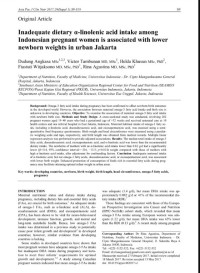Inadequate dietary α-linolenic acid intake among Indonesian pregnant women is associated with lower newborn weights in urban Jakarta

Author
Helda Khusun - Personal NameFiastuti Witjaksono - Personal Name
Rina Agustina - Personal Name
Dudung Angkasa - Personal Name
Victor Tambunan - Personal Name
Abstract
Background: Omega-3 fatty acid intake during pregnancy has been confirmed to affect newborn birth outcomes in the developed world. However, the association between maternal omega-3 fatty acid intake and birth size is unknown in developing countries.
Objective: To examine the association of maternal omega-3 fatty acid intake with newborn birth size.
Methods and study design: A cross-sectional study was conducted, involving 282 pregnant women aged 19-40 years who had a gestational age of >32 weeks and received antenatal care at 10 health centres and one referral hospital in East Jakarta, Indonesia. Maternal habitual intake of omega-3 fatty acids, including α-linolenic acid, docosahexaenoic acid, and eicosapentaenoic acid, was assessed using a semiquantitative food frequency questionnaire. Birth weight and head circumference were measured using a paediatric weighing scale and tape, respectively, and birth length was obtained from medical records. Multiple linear regression analysis was performed to provide adjusted associations.
Results: The median total intake of omega-3 fatty acids, docosahexaenoic acid, eicosapentaenoic acid, and α-linolenic acid was lower than the recommended dietary intake. The newborns of mothers with an α-linolenic acid intake lower than 0.82 g/d had a significantly lower (β=114, 95% confidence interval=-216, -13.5; p=0.014) weight compared with those of mothers with high α-linolenic acid intake, after adjustment for confounding factors.
Conclusion: Inadequate maternal intake of α-linolenic acid, but not omega-3 fatty acids, docosahexaenoic acid, or eicosapentaenoic acid, was associated with lower birth weight. Enhanced promotion of consumption of foods rich in essential fatty acids during pregnancy may facilitate attaining optimal infant weight in urban areas.
Detail Information
| Series Title | : | - |
| Call Number | : | - |
| Publisher | : | : Asia Pac J Clin Nutr., 2017 |
| Collation | : | Asia Pac J Clin Nutr . 2017 Jun;26(Suppl 1):S9-S18. |
| Language | : | English |
| ISBN/ISSN | : | - |
| Classification | : | NONE |
 Computer Science, Information & General Works
Computer Science, Information & General Works  Philosophy & Psychology
Philosophy & Psychology  Religion
Religion  Social Sciences
Social Sciences  Language
Language  Pure Science
Pure Science  Applied Sciences
Applied Sciences  Art & Recreation
Art & Recreation  Literature
Literature  History & Geography
History & Geography